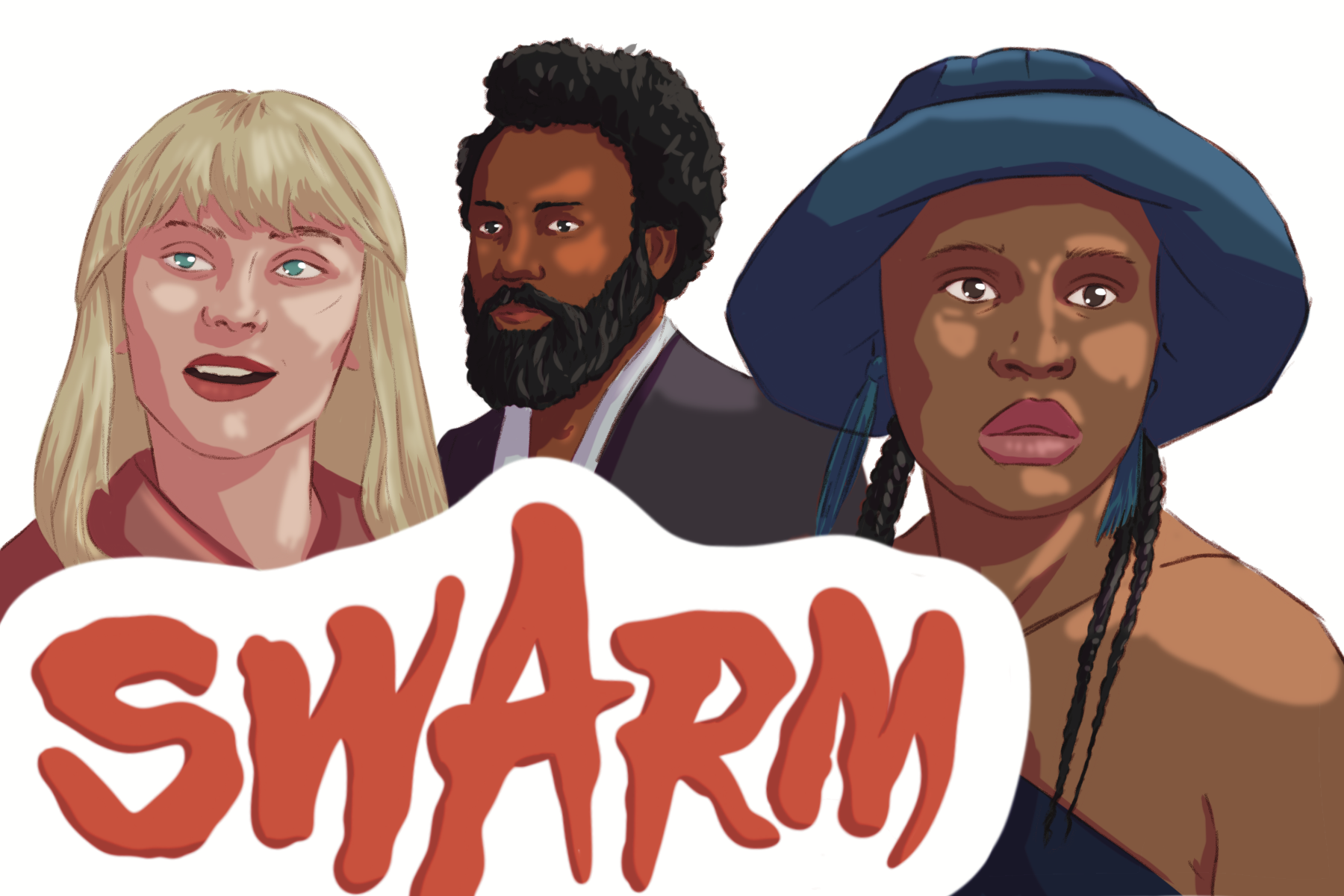TW: Suicide
“Swarm” is a psychological dark comedy series that premiered on Amazon Prime Video in March 2023. The show follows Andrea “Dre” Greene, a superfan — or “stan”— of the fictional popstar Ni’Jah. After she suffers a personal tragedy, Dre’s fandom soon erupts into obsession. She slashes her way through the show, popping up in each episode under a new pseudonym and the same fatal question: “Who’s your favorite artist?” Executive producers Janine Nabers and Donald Glover developed a striking story about fan culture, cults of personality and trauma. However, it doesn’t quite stick the landing.
Dre is a singular, enigmatic character. She’s clumsy and awkward, a far cry from the shrewd, smooth-talking serial killers in “You” and “American Psycho.” She rarely speaks unless spoken to, and sometimes not even then. She lashes out impulsively, and she never thinks too many steps ahead. This kind of character could easily feel cartoonish, but lead actress Dominique Fishback infuses Dre with terrifying and complex intensity, making her a fascinating watch. Her minute, jittery mannerisms and her bright eyes, always brimming with tears, reveal her humanity. She is not calculated — she is driven by brutal emotion.
Unfortunately, the overarching themes of “Swarm” aren’t nearly as complex. The show castigates stan culture, the worst parts of which Dre embodies. She and her sister Marissa have loved Ni’Jah since they were kids, but Dre’s fixation exceeds typical fan hysteria. She goes from spending her rent money on concert tickets to killing for them in just seven episodes. This behavior is by no means an exaggeration. In 1981, John Hinckley Jr. shot President Ronald Reagan to garner attention from then-teenage actress Jodie Foster. In 1996, Björk’s stalker Ricardo López sent a bomb to the Icelandic singer’s house and committed suicide on tape.
In the internet era, crazed fans have even more power. Dre’s modus operandi revolves around her Twitter fan account, which she uses to stalk Ni’Jah detractors and leak their personal information in a process called doxxing. Doxxing has its fair share of real-life victims. After Nicki Minaj married convicted rapist Kenneth Petty in 2019, Minaj’s fans harassed Petty’s accuser Jennifer Hough online for speaking out against Minaj’s predatory legal team. Rabid K-Pop fans, called sasaengs, use the internet to find their idols’ passports, phone numbers and addresses. “Swarm” accurately depicts this type of violence, but its commentary is surface-level at best.
The ultimate failure of “Swarm” is that it seems to be just as obsessed with Ni’Jah — and her real-life counterpart — as Dre is. At the beginning of each episode, a tongue-in-cheek disclaimer reads: “This is not a work of fiction. Any similarity to actual persons, living or dead, or actual events, it intentional.” Ni’Jah has several parallels to Beyoncé. Her fans (“killer bees”) are collectively called the Swarm, clearly referencing the BeyHive. Ni’Jah’s music (performed by singer Kirby) is a pop/R&B blend reminiscent of Beyoncé’s “Renaissance.” In brief appearances, Ni’Jah and her rapper husband Caché wear outfits based on Beyoncé and Jay-Z’s real red carpet looks. Ni’Jah has twins, she writes an album about getting cheated on, she owns an athleisure clothing line, she gets bitten at a party, and there’s even a video of her sister and husband fighting in an elevator.
“Swarm” could’ve examined how celebrities materially benefit from toxic fan culture and how their exorbitant wealth detrimentally impacts our world. Last year, Beyoncé and Jay-Z ranked third in the world for the most private jet CO2 emissions. After the 2022 Oscars ceremony, she crossed a picket line to attend an afterparty at the Chateau Marmont Hotel. Loyal fans who buy music, tickets and merchandise fuel Beyonce’s financial and cultural capital, ultimately contributing to these offenses. There’s ample ground for thoughtful criticism, but instead, the show nitpicks Beyoncé’s personal life and artistry. It comes off as a spiteful parody of a Black female artist and her fans rather than a meaningful critique of self-destructive celebrity idolization.
“Swarm” is ripe with plenty of other references to real-life fame. The star-studded cast features R&B singer Chlöe Bailey (she and her sister Halle Bailey are Beyoncé’s protégés) as Marissa, Billie Eilish as an alluring cult leader and Paris Jackson, Michael Jackson’s daughter, as an exotic dancer. These actresses allude to the reality of crazed fandoms, but the show expects their mere presence to serve as a complex analysis of the issue. These portrayals feel more like a “spot the celebrity” challenge than an inspired casting choice. “Swarm” is too caught up in flashy names to reach the real root of the story.
Dre’s obsession with Ni’Jah clearly stems from trauma. Episode five, “Girl, Bye,” reveals that she was a rehomed foster child. Years of systemic rejection inculcated a need to feel loved, and stanning someone who can never know or hurt her is the perfect solution. “Girl, Bye” sets up the perfect opportunity to delve deeper into Dre’s background and wrestle with some difficult topics. So, of course, the narrative veers into a mockumentary-style investigation in which a sassy police officer summarizes Dre’s childhood. This is a jarring detour, emphasized by the switch from grainy film cinematography to digital camerawork. Although the finale returns to Dre’s perspective, the show never quite regains the honesty of previous episodes.
Co-executive producer Janine Nabers began her playwriting career with the aim of creating well-rounded Black female characters. Of her 2015 play “Serial Black Face,” she said, “The thing that I’m the most proud of…is the fact that it’s a vehicle for a woman. I feel like theater is missing so many stories from a Black experience…I was very much determined to write a tragedy from a Black woman’s perspective.” Since then, she has written for “Girlfriend’s Guide to Divorce,” “UnREAL,” and “Watchmen,” all of which feature complex female characters.
However, “Swarm” isn’t just Nabers’ brainchild. In an interview with Vulture, Donald Glover said that he “didn’t want the audience to understand…Dre [because she’s] not that layered.” He directed Fishback to “think of [Dre] as more like an animal and less like a person,” playing on a long history of Western media’s dehumanization of Black women. Glover has made disturbing comments about Black women for years in previous interviews and in his music as Childish Gambino. Many viewers criticized the hollow Black female characters in Glover’s FX show “Atlanta.” These issues indicate a pattern of behavior that denies Black women’s right to nuanced, humanistic representation in media.
Due to the lackluster exploration of its main character, “Swarm” doesn’t deliver on its premise. The show raises provocative questions about trauma and stan culture, but it doesn’t fully integrate these themes. Dre nearly bleeds tragedy in each scene, but the show makes no attempt to analyze the source of the wound. Instead, it staunches the flow with big names and snarky jokes, abandoning the intimacy that a character like Dre so desperately needs.

















